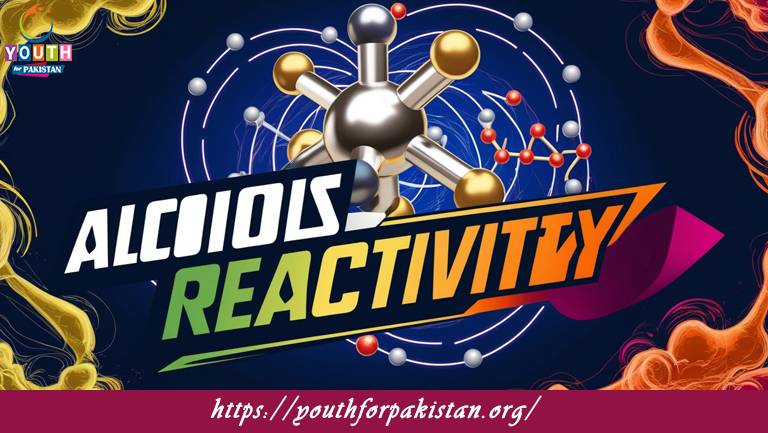Welcome to the Alcohols Reactivity MDCAT MCQs with Answers. In this post, we have shared Alcohols Reactivity Multiple Choice Questions and Answers for PMC MDCAT 2024. Each question in MDCAT Chemistry offers a chance to enhance your knowledge regarding Alcohols Reactivity MCQs in this MDCAT Online Test.
The reactivity of alcohols towards oxidation is generally highest for:
a) Primary alcohols
b) Secondary alcohols
c) Tertiary alcohols
d) Phenolic alcohols
Which type of alcohol reacts with Lucas reagent to form an insoluble alkyl chloride?
a) Primary alcohol
b) Secondary alcohol
c) Tertiary alcohol
d) All types of alcohols
Alcohols can be dehydrated to form alkenes. The reagent commonly used for this reaction is:
a) HCl
b) H2SO4
c) NaOH
d) K2Cr2O7
The oxidation of a secondary alcohol generally produces:
a) An aldehyde
b) A ketone
c) A carboxylic acid
d) An ester
Which alcohol is most resistant to oxidation?
a) Methanol
b) Ethanol
c) Isopropanol
d) Tert-butanol
Alcohols can undergo esterification with which reagent?
a) Carboxylic acid
b) Sodium hydroxide
c) Sulfuric acid
d) Hydrogen chloride
The reaction of alcohols with PCl3 results in the formation of:
a) Alkyl chloride
b) Alkyl bromide
c) Alkyl iodide
d) Alkyl sulfate
Alcohols react with which reagent to form alkyl halides in the presence of an acid catalyst?
a) PBr3
b) NaCl
c) HBr
d) NaI
Tertiary alcohols undergo oxidation with:
a) KMnO4
b) Na2Cr2O7
c) Both a and b
d) Neither a nor b
In the reaction with sulfuric acid, alcohols typically form:
a) Aldehydes
b) Ketones
c) Alkenes
d) Carboxylic acids
Which reagent is used to convert alcohols to alkanes?
a) Zinc
b) Sodium
c) Magnesium
d) Lithium
Which type of alcohol is most reactive towards oxidation?
a) Primary alcohol
b) Secondary alcohol
c) Tertiary alcohol
d) Phenolic alcohol
The reaction of alcohols with phosphorus trichloride yields:
a) Alkyl chlorides
b) Alkyl bromides
c) Alkyl iodides
d) Alkyl sulfates
Alcohols can be dehydrated to form alkenes using which type of catalyst?
a) Acidic catalyst
b) Basic catalyst
c) Neutral catalyst
d) None of the above
The reactivity of alcohols with carboxylic acids is enhanced in the presence of:
a) Sulfuric acid
b) Sodium hydroxide
c) Hydrogen chloride
d) Potassium permanganate
Which type of alcohol reacts with PCC to form an aldehyde?
a) Primary alcohol
b) Secondary alcohol
c) Tertiary alcohol
d) Phenolic alcohol
Alcohols can be converted into alkyl halides using which reagent?
a) HCl
b) NaOH
c) NaHCO3
d) H2SO4
The reaction of alcohols with sodium metal produces:
a) Alkyl sodium
b) Sodium hydroxide
c) Hydrogen gas
d) Sodium chloride
Alcohols react with which reagent to produce ketones?
a) CrO3
b) HCl
c) NaOH
d) H2SO4
Primary alcohols are oxidized to:
a) Aldehydes and then to carboxylic acids
b) Ketones
c) Alkanes
d) Alkenes
The oxidation of primary alcohols with a strong oxidizing agent yields:
a) Aldehydes
b) Ketones
c) Carboxylic acids
d) Alkanes
Which alcohol type does not typically undergo oxidation?
a) Primary alcohol
b) Secondary alcohol
c) Tertiary alcohol
d) All types of alcohols
The reaction of alcohols with hydrogen halides to form alkyl halides is known as:
a) Substitution reaction
b) Addition reaction
c) Elimination reaction
d) Reduction reaction
Which alcohol undergoes oxidation to form an ester without further oxidation?
a) Primary alcohol
b) Secondary alcohol
c) Tertiary alcohol
d) Phenolic alcohol
In the reaction of alcohols with sodium, which product is formed?
a) Sodium alkoxide
b) Sodium hydroxide
c) Sodium chloride
d) Sodium sulfate
The oxidation of tertiary alcohols results in:
a) Aldehydes
b) Ketones
c) Carboxylic acids
d) No reaction
The reaction of alcohols with sulfuric acid to form alkenes is an example of:
a) Dehydration reaction
b) Oxidation reaction
c) Reduction reaction
d) Substitution reaction
Alcohols react with which reagent to form alkyl bromides?
a) PBr3
b) NaBr
c) HBr
d) KBr
Which alcohol is typically used as a solvent in chemical reactions due to its low reactivity?
a) Methanol
b) Ethanol
c) Isopropanol
d) Tert-butanol
The reaction of alcohols with sodium hydroxide to form an alkoxide is a:
a) Neutralization reaction
b) Acid-base reaction
c) Oxidation reaction
d) Substitution reaction
Alcohols are converted to carboxylic acids using which reagent?
a) KMnO4
b) HCl
c) NaOH
d) H2SO4
Which alcohol reacts with iodine in the presence of an alkali to form a triiodomethane derivative?
a) Primary alcohol
b) Secondary alcohol
c) Tertiary alcohol
d) None of the above
Phenols are more reactive towards:
a) Oxidation
b) Esterification
c) Substitution
d) Dehydration
Alcohols can be converted to ethers using which reagent?
a) H2SO4
b) NaOH
c) HCl
d) KMnO4
Which alcohol reacts with strong acids to form a carbocation intermediate in dehydration reactions?
a) Primary alcohol
b) Secondary alcohol
c) Tertiary alcohol
d) All types of alcohols
The reaction of alcohols with oxalyl chloride yields:
a) Alkyl chlorides
b) Alkyl bromides
c) Aldehydes
d) Carboxylic acids
The reactivity of alcohols in esterification is enhanced by:
a) Acid catalysts
b) Basic catalysts
c) Neutral conditions
d) High temperatures
Alcohols react with zinc to form:
a) Alkyl zinc halides
b) Alkyl hydrides
c) Zinc alkoxides
d) Alkyl radicals
The reactivity of alcohols with phosphorus pentachloride yields:
a) Alkyl chlorides
b) Alkyl bromides
c) Alkyl iodides
d) Alkyl phosphates
Alcohols are oxidized to ketones using which reagent?
a) Jones reagent
b) H2SO4
c) NaOH
d) HCl
If you are interested to enhance your knowledge regarding Physics, Chemistry, Computer, and Biology please click on the link of each category, you will be redirected to dedicated website for each category.








